Unit4复备
6BUnit4 Road safety教案
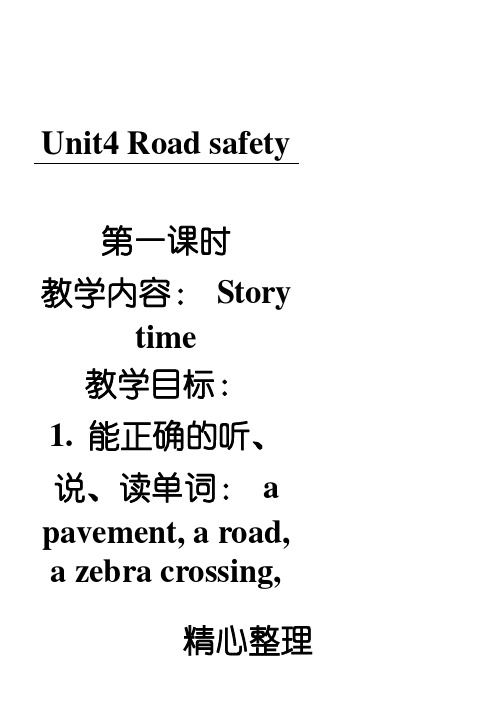
Unit4 Roadsafety精心整理a zebra crossing, green man, red出现的交通规则:精心整理You must first look for a zebraWe mustn’t run精心整理and play on the road. etca zebra crossing,精心整理green man, redman, traffic4.通过本课时的学精心整理习,让学生能够理解一些常见的交通单词卡片,挂图,精心整理多媒体课件教学过程:come to school?精心整理Ss: I come to school by bus\is the most精心整理important for us. (Learn the topic:1. L earn the new精心整理wordsT: Boys and girls,pictures about精心整理them and learn the new words.each other to精心整理learn the words. Have a chant:yellow light,精心整理wait ,wait, wait. Green light,6. Do you know any精心整理traffic rules? Read the rules言输出做铺垫。
)精心整理We must walk on the pavements.We mustn’t run精心整理and play on the road. ( )T: Well down.精心整理You know many traffic rules.须。
它的否定形式精心整理是mustn’t. can 的语气相对弱些,can’t find a精心整理zebra crossing, you can wait onthe road with精心整理other people. Because theE. B efore精心整理crossing the road, you must firstanswer.精心整理2) Listen andrepeatCheck in精心整理groups.The teacherpoliceman, What精心整理should you say? T shows theman. You can精心整理cross the roadnow.see you easily.精心整理You mustn’t play on the road.on page 38.精心整理Work in groups. What must you dothe books.精心整理Summry: 情态助mustn’t: 禁止。
Unit4LifeonMars教案牛津译林版英语九年级下册

1. Learn about what life would be like on another planet in the future.
2. Talk about the advantages and disadvantages of living on Mars and Earth.
教学过 程
集体备课
与二次复备札记
Step 1 Prereading
1. Free talk
Task1Question
T: Do you know anything about Mars?
S:…
T:Mars is the nearest to Earth.Thesurfaceof Mars is a little like the surface of Earth.
2.too +adj.+ to do/... so ... that ...can’t ..../...adj.+enough to do …
T:How long does the spacecraft need to get to Mars at present?
3. at the speed of
Life on Mars
1._________ gravity
2. wear _________ boots
3. need __________ bags
4. eat ___________ food
5. no _____________
Feelings
_____________
2. Watch and discuss
集体备课
与二次复备札记
ic strip
(公开课教案)9BUnit4Integratedskills(教案)
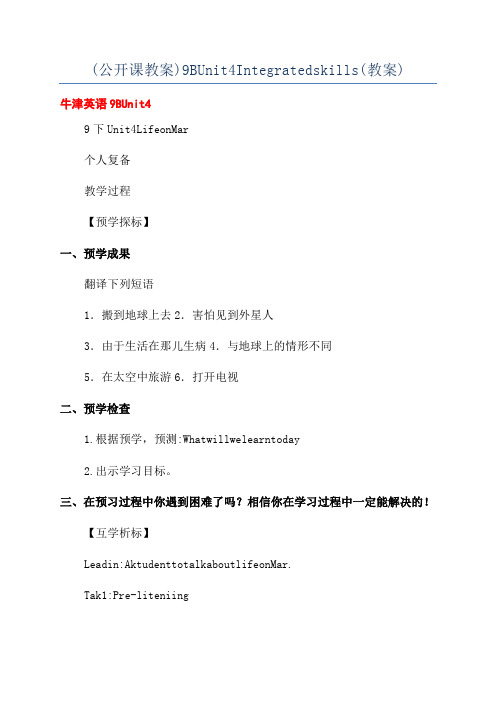
(公开课教案)9BUnit4Integratedskills(教案)牛津英语9BUnit49下Unit4LifeonMar个人复备教学过程【预学探标】一、预学成果翻译下列短语1.搬到地球上去2.害怕见到外星人3.由于生活在那儿生病4.与地球上的情形不同5.在太空中旅游6.打开电视二、预学检查1.根据预学,预测:Whatwillwelearntoday2.出示学习目标。
三、在预习过程中你遇到困难了吗?相信你在学习过程中一定能解决的!【互学析标】Leadin:AktudenttotalkaboutlifeonMar.Tak1:Pre-liteniing1.E某plainPart.A1totudent.DanieligoingtowatchaTVprogramme.Ontheprogra mmepeoplewilldicuwhatitmightbeliketoliveonMar.Telltudentthatthe yhouldfindforthemtolitencarefullyandfindtheinformationthattheyneed,theecondforthemtochecktheanwer.Dicutheanwerinpair.Thenakfivetudenttopreentthe iranwertothewholeclaforthemtopointoutthemitakeifthereiany.Tak2:While-litening1.E某plainPartA2totudent.DanieliwatchingtheTVprogram,anditiadicuionabouttheadvantageanddiadvantageoflivingonMar.Studenthouldlitencar efullyand2.Playtherecordingforthetudenttoliten.Playtwiceforthemtogeti nformationandchecktheanwer.Tak3:Pot-liteningAktudenttodoE某erciePartA3ontheirown.Thenhavethempracticetheconverationinpair.Aktwogrouptoactouttheconverationinfrontofthecla.Fortr ongertudent,theyaree某pectedtocloethebookandactouttheconveration.【促学化标】Speakup牛津英语9BUnit4个人复备Tak5:DanielandSandyaretalkingaboutlivingonMar.Workinpairandd icuwhetheryouwouldliketoliveonMar.Uetheconverationbelowaamodel.Tak6:Makeupnewconverationinpair.Akomepairtohowtheirconverati on.Tak7:Groupwork:Whathavewelearntthicla【回学验标】小结(Summary)思考:Whathavewelearnedfromthiclatoday________________________________ __________________________________【评学测标】翻译句子。
七年级英语下册Unit4~Unit6 复习课件
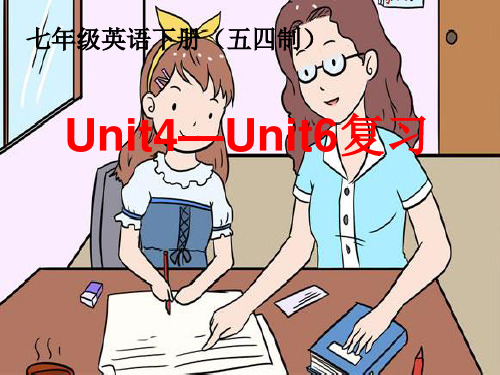
三、核心句子
ቤተ መጻሕፍቲ ባይዱ
重点句型
1.It_i_s_t_h_e__d_u_t_y_o_f_d_o__c_to_r_s_t_o__s_a_v_e_t_h_e__lives of patients
拯救病人的生命是医生的职责
2.It’s best not __n_o_t_t_o__ru_n__a_w__a_y_f_ro__m___ our problems
语法突破
C.祈使句+ and(or)+ 陈述句 和if 条件状语从句的转换。 1)早点起床,否则你会迟到。 Get up early, ___ you’ll be late. = ___ you ___ get up early , you’ll be late. 2)努力学习你就会通过考试。 Study hard and you ___ pass the exam. =____you study hard, you ___ pass the exam.
重点短语
1.__c_u_t _u_p____切碎, _c_u_t_o_f_f ____切断;中断;使死亡;剥夺继承权 _c_u_t_d_o_w_n___v. 削减;砍倒;杀死 _c_u_t_o_u_t____ 切断;删去;停止;关掉
Unit 4 Natural Disasters 复习课件
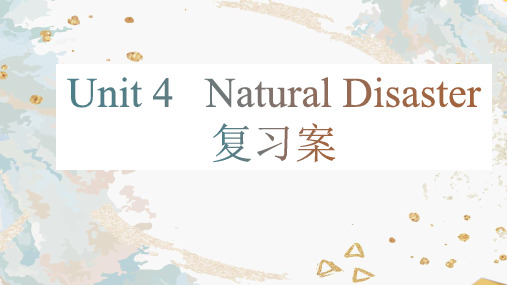
_____e_l_e_c_tr_o_n_i_c_adj.电子的___e_le_c_t_r_ic_a_l____adj.带电的
electronic products/equipment 电子产品/设备
electrical appliance 电器
7.____b_r_e_a_th_e______vt.& vi.呼吸____b__re_a_t_h_____n.呼吸
6. __li_e__in__r_u_i_n_s______ 成为废墟
7. _i_n_t_h_e__o_p_e_n__a_i_r___ 露天,在户外 8. __i_n_s_h__o_c_k________ 震惊
get through 通过;到达;做完;接通电话;度过,熬过(困难时期等)
9. __g_o_t_h_r_o__u_g_h______ 经历
as if/though实或不可能发 虚拟过去:had done
生的情况) 虚拟将来:would/might/Βιβλιοθήκη could+do上一页
返回导航
下一页
[佳句背诵] Some people, on losing a job, may feel as if it were the end of the world. 有些人一失去工作,就觉得好像到了世界末日似的。 [名师点津] 如果as if引导的从句是“主语+系动词”结构,可省略主 语和系动词,这样as if后就只剩下名词、不定式、形容词(短语)或动词 -ing形式。
16.____c_a_lm________adj. 镇静的;沉着的
emergent nations/states 新兴民族╱国家
___c_al_m__n_es_s_____n.镇静;沉着;冷静
Unit 4 Do it yourself ---Welcome to the unit
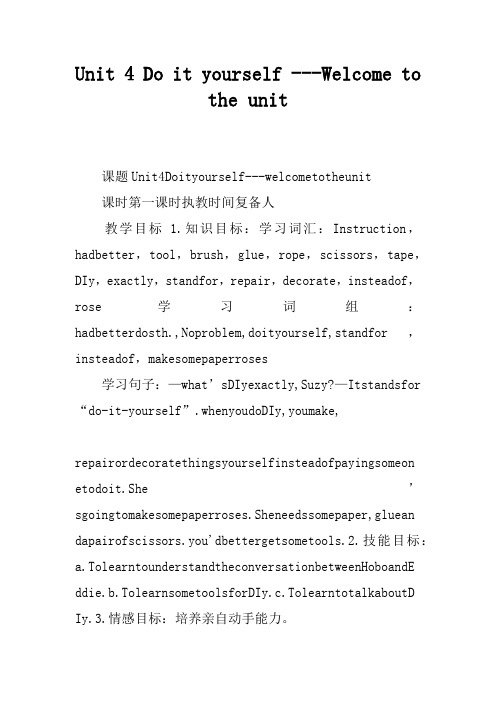
Unit 4 Do it yourself ---Welcome tothe unit课题Unit4Doityourself---welcometotheunit课时第一课时执教时间复备人教学目标 1.知识目标:学习词汇:Instruction,hadbetter,tool,brush,glue,rope,scissors,tape,DIy,exactly,standfor,repair,decorate,insteadof,rose学习词组:hadbetterdosth.,Noproblem,doityourself,standfor,insteadof,makesomepaperroses学习句子:—what’sDIyexactly,Suzy?—Itstandsfor “do-it-yourself”.whenyoudoDIy,youmake,repairordecoratethingsyourselfinsteadofpayingsomeon etodoit.She’sgoingtomakesomepaperroses.Sheneedssomepaper,gluean dapairofscissors.you'dbettergetsometools.2.技能目标:a.TolearntounderstandtheconversationbetweenHoboandE ddie.b.TolearnsometoolsforDIy.c.TolearntotalkaboutD Iy.3.情感目标:培养亲自动手能力。
教学重点词汇识记运用,重点句型的运用。
教学难点LearntotalkaboutDIy.教学媒体录影机,多媒体,实物等教学过程Step1:预习指导与检测见导学案交流预习情况,讨论预习中存在的问题Step2:展示目标见导学案Step3:课堂导学与互动任务一:FreetalkShowsomepicturestotalkaboutwhatisdo-it-your self.任务二:PresentationShowsomepicturestotalkabouthowtodoityou rself.T:EddieandHobowanttodosomethingbythemselves.Ask:Howcanwedoityourself?DIyasweater:如果你觉得自己的sweater太过单调,可以试着在上面画一幅画。
九年级英语Unit4备课(四课时)
老师鼓励学生大胆开口说,不要怕出错。
3、Reading:能够依据从问题入手的阅读策略,阅读3a有关imaginary situations并给出建议的探讨,获取文章具体细节,能理解句子之间的逻辑关系。
老师给学生提供一定的阅读技巧。
4、Writing:学生能过写一篇有关what would you do if ---的作文
听:中游学生能够听懂interesting and embarrassing situations的话题,能够提取信息。
说:中游学生能够有效谈论imaginary situations,能根据本单元话题进行角色表演。
读:中游学生能够依据从问题入手的阅读策略,获取文章具体细节,找出文章主题,归纳文章大意。
一、语言技能:
1、Listening:能听懂interesting andembarrassingsituations的话题,并能从对话中提取信息;能针对所听语段的内容记录标记信息。
指导学生的学会听,培养听得技巧和策略。
2、Speaking:能有效谈论imaginary situations并给出建议;能根据话题进行角色表演;口语活动中做到语音、语调自然,语气恰当。
要求学生有一个良好的听力习惯。
2、Speaking:能有效谈论imaginary situations并给出建议;能根据话题进行角色表演;口语活动中做到语音、语调自然,语气恰当。
人教pep版五年级下册英语unit4_b_read_and_write名师教案
六、教学设计
第6课时
教学环节
教学预设
热身/复习(Warm-up/Revision)
1.复习本单元所学序数词。
2. Free talk
—When is your birthday?
—It’s on ...
呈现新课(Presentation)
(1) Fill in the table;
(2) Finish the sentences;
(3)图解基数词和序数词,如:3本-第3本。
3. Story time
(1)默读故事,给小故事起个名字吧;
(2)看动画,回答Zoom都收到了哪些邀请;
(3)哪一次邀请,Zoom愉快地答应了?为什么?
(4)给图片排序;
3.能在老师的帮助和图片的提示下,描述或讲述简单的小故事;
4.能根据图片、词语或例句的提示,写出简短的语句。
二、教材解析
Read and write:以日记的形式,考查学生对序数词的理解运用。
Let’s wrap it up:对比学习基数词与序数词。
Story time:以趣味小故事的方式呈现本单元的话题要点,让学生在轻松愉悦中巩固本单元所学内容。
教材版本:PEP小学英语五年级下册第四单元
课题
Unit 4 When is the art show?
课型
复习课
内容
Part B Read and write
Let’s wrap it up
Part C Story time
主备人
复备教师
一、课程标准
1.能听懂简单的配图小故事;
2.能借助图片读懂简单的故事或小短文,并养成按意群阅读的习惯;
Unit4单元复习练习人教版九年级英语上册.docx
九年级上学期人教版英语Unit 4单元复习练习一•单项选择:1.I'm looking after Tom today. He's been in my house 8:00 this morning.A.atB. sinceC. forD. till2.As we know, England is _ European country and Singapore is _ Asian country.A.an; anB.a; aC. an; aD.a; an3.—My watch doesn't work. Could you mend it, please?—Sorry. But the workers in that watch shop may be.A.kindB. friendlyC. niceD. helpful4.— my surprise, the big boy is afraid _ insects.A.To: ofB. To; forC. With; ofD. With; for5.Mr. Green is very. He is good at telling jokes in class and we all like him very much.A. kindB. humorousC. seriousD. polite6.The program has helped out thousands of homeless children since the government it.A. startsB. had startedC. will startD. started7.Mike and his friends used to play soccer;?A. don't theyB. do theyC. didn't theyD. did they8.—How is your grandma?—She's fine. She used to _TV at home, after supper. But now she is used to —out for a walk. A. watch; go B. watching; goC. watching; goingD. watch; going9.My father wants to give up but it's hard for him to _.A. smoke; give up itB. smoking; give up itC. to smoke; give it upD. smoking; give it up10.—How was the weather there today?—Sunny, but cloudy —.A. in timeB. on timeC. all the timeD. from time to time11.The computer is very in our life. Some people even say that they can't live without it.A. helpfulB. thankfulC. carefulD. harmful12.We advise parents their children at home alone in order to keep them away fromdangerA. leavingB. not to leaveC. leaveD. to leave13.We all know lazy people succeed, so we should work hard to be successful.A. oftenB. seldomC. usuallyD. always14.Parents always enjoy any progress their children have made and will be them.A. angry withB. interested inC. proud ofD. worried about15.The experts (专家)tried to make the Xfan-Chengdu high-speed railway have the least on the wild animals around. •A. trafficB. materialC. influenceD. accident f二. 完形填空:Do you know Marie Kondo ? She is a writer from lapan. 16 she has ■♦踏only written four books until now, she is already a world-famous writer. 17 first book, which is also the most popular one, The Life-Changing Magic of Tidying Up has been published(出版)inmore than 30 countries.What does this popular book talk 18 ? As you can see from the 19 of the book, it tells people 20 to tidy things up.This book has helped me a lot because I was not 21 cleaning the house at all and my bedroom was always in a 22 .It is this book that has helped me out.Marie Kondo has helped a lot of people keep their 23 in order(井然有序).She tells us that we should only own things that are useful and bring 24 joy.We should throw away things that aren't needed so that we can keep our houses clean and 25 .Marie Kondo says people can improve their life by 26 the way that they deal with all their things—everything from books, documents and photographs to clothing.She often goes to her fan club and 27 people to tidy up things there.Even though she's famous, Kondo 28 keeps her own house tidy by herself.Kondo 29 that keeping things tidy can bring people joy and change their life.Do you have 30 tidying things up? Let Kondo help you!16. A.Since B.If C.Although D.Because17. A.My B.Her C.His D.Their18. A.about B.with C.for D.at19. B.address C.number D.research20. A. why B.where C.what D.how21. A.bad for B.good for C.good at D.bad at22. A.mess B.pity C.chance D.tradition23. A.business B.courses C.houses D.request24. A.me C.it D.them25. A.strong B.quiet C.tidy D.dirty26. A.changed B.change C.to change D.changing27. A.allows B .warns C.teaches D.requests28. A.seldom B.still C.already D.also29. A.disagrees B.forgets C.requires D.believes30. A.problems B.jokes C.answers D.differences三. 阅读理解:AThe morning was cold and clear. A yellow bus came around the corner and stopped near a wood (树林).A coach asked the students to get off the bus. Girls began to gather by the starting line. One of them is a young, little girL She had prepared for this running race for the whole summer. She looked around at the other girls, noticing how she was different.There was a break in the silence, and everyone started to run. After about twenty five minutes, every runner finished the race except the girl She was still running for the next forty minutes. As she came near the finishing line, she saw her parents, classmates and the coach. They shouted her name and told her not to stop until the end. The sweat (汗水)was flowing down her face. She kept on running until she crossed the line.I was that girl, and that was the first time I had finished a cross-country race (越野赛跑). Finishing this race made me realize that I could do anything with my own strength (力量). After that, I took more hard work to practice running. I was not a natural-born runner; but I want to become one. I continued to struggle (努力)with every run. Now I run much faster than before and become more and more confident. I am so thankful for running because it has helpedmake me who I am today.31.The cross-country race took place.A. in a schoolB. near a woodC. in a big cityD. on the playground32.The writer finished her first cross-country race in about minutes.A. 20B.25C. 40D. 6533.From the sentence "I was not a natural-born runner”, we learn that the writer .A. wasn't good at runningB. didn't like runningC. ran faster than anyoneD. couldn't run when she was born34.What can we infer(推断)from the passage?A.All good runners are natural-born.B.The writer didn't use to be so confident.C. A good coach is the most important for a runnerD.The writer is a very good runner now.35.What's the main idea of the passage?A.We should practice running if we want to be more confident.B.We should do things that we are good at.C.We should keep on doing what we want to, no matter whether we are good at it or not.D.We could become the best if we keep on practicingBAs a student, I was most afraid to answer questions in class, and I found that the students around were just like me. At the beginning of each class, when the teacher asked a question, I always lowered my head because I was afraid that the teacher saw me.One day, in a foreign language class, Mr. Black gave us a lesson. He wanted us to be active in class, so he asked us some questions, but no one answered"Let me tell you a story first, "he said.“When I came to the United States to study, the unieversity often invited famous people to make speeches. Be-fore the beginning of every speech, I found an interesting thing. The students around me always took a cardboard folded(折叠的)in half, wrote their names in bold with the most eye-catching color, and then placed the cardboard on the seat. So when the speaker needed the answers from the students, he could see and call a listener's name directly.”"I couldn't understand that. My classmate told me the speakers were all top people, who meant chances. When your answer was to his surprise, it meant he might give you more chances. In fact, I really saw a few students got great chances because of that.”After listening to the story, I understood that the chance will not find you itself. You must show yourself all the time so that you can find a chance on the card.36.What did Mr. Black want the students to do in his class?A. Read loudly.B. Take notes carefully.C. Be active.D. Listen to him quietly.37.How did the writer's classmates behave when they were asked questions?A. They raised their hands.B. They shook their heads.C. They closed their eyes.D. They lowered their heads.38.How did the speaker get to know the student's names?A.He got them from the computerB.He saw the cardboard on the seats.C.He asked the students for their names.D.He got them from the name list on the teacher's desk.39.What does the underlined word"eye-catching"in Paragraph 3 mean?A.引人注目的B.眼睛疼痛的C.目光呆滞的D.泪眼朦胧的40.What does the writer mainly tell us?A.Doing as others do is necessary,B.Answering questions bravely is easy.C.Attracting others' attention is interesting.D.Showing yourself bravely can win chances.四. 词汇运用:41.My uncle is(幽默的),she often makes us laugh.42.The reporter was(采访)a boss at this time yesterday.43.Now she(敢)to speak English in class.44.There are four(警卫)standing over there.45.The accident had a great(影口向)on their family.46.Have you heard of the saying"(fail)is the mother of success/?47.Please give me an explanation for your(absent).48.The red dress is(exact)what I want to buy.49.We are waiting to have a medical(examine).50.Here's the(introduce)to the new operating system.五. 完成句子:51.Paula过去喜欢唱歌。
英语八年级上册《unit4》教案
主备教师
审核教师
授课周次
授课时间
课题
Unit4 Unit Review
课型
教学目标
nguage goals:
Review words in unit 4
Some phrases and difficult sentences.
Key structures: because引导的原因状语从句
Our school is really a good place for us to study in.
完成课本Unit Review4 (Grammar in use)
Step 8. Homework.
板书设计
1:words and phrases
2:Grammars
1).Because, since, as, for用法区别
e.g.I watched the movie because I was interested in it.
= I was interested in the movie so I watched it. 2.since引导原因状语从句一般放于主句之前,表示已知的,显然的理由(通常被翻译成“既然”)较为正式,但语气比because弱e.g.Since you are free today,you can go shopping with me. 3.as引导原因状语从句时表示附带说明的“双方已知的原因”,语气比since弱,较为正式,位置较为灵活(常放于主句之前)e.g.As you are tired,you had better have a rest. 4.for引导原因状语从句并不说明主句行为发生的直接原因,只提供一些辅助性的补充说明,for引导原因状语从句只能放于主句之后并且必须用逗号将其与主句隔开。e.g.He could not have seen me,for I was not there. Step 2. Practice(5)because,since,.as,for填空
- 1、下载文档前请自行甄别文档内容的完整性,平台不提供额外的编辑、内容补充、找答案等附加服务。
- 2、"仅部分预览"的文档,不可在线预览部分如存在完整性等问题,可反馈申请退款(可完整预览的文档不适用该条件!)。
- 3、如文档侵犯您的权益,请联系客服反馈,我们会尽快为您处理(人工客服工作时间:9:00-18:30)。
2013-2014学年第二学期非凡学校集体备课
教师专用教案(复备稿)
课题: 七年级英语Unit 4 Don’t eat in class.
Section B PeriodⅠ(1a-1d)
主备人: 刘仁仙 授课教师: 授课时间:
Ⅰ.Teaching Aims and Demands
1. Knowledge Objects
a. words and phrases :1) n. practice, dish
2) adv. out, before
3) go out, do the dishes
b. Sentences: Can Dave go out on school nights?
No, he can’t.
2. Ability Objects
Speaking, reading and listening skills
3. Moral Objects
Children should obey the rules in their houses and places. As a student, they should follow the
rules of school.
Ⅱ. Teaching Key Points
Improve Ss’ listening skills.
Ⅲ. Teaching Difficulties
Distinguish can, must and have to
Ⅳ.Teaching Methods
Reading and explanation.
Listening and speaking methods, group work, role-play
Ⅴ.Teaching Aids:
A recorder, some chalks
Ⅵ. Teaching Procedures
Step1.Warm-up and revision
Review the words and phrases we have learned last period. Have a detection.
Step2. Lead-in
Write these phrases on the blackboard. Lead Ss to translate them. Give Ss three minutes
to read. Let Ss get familiar with them.
1. go out on school nights 2. see friends
3. do his homework 4. practice the guitar
5. do the dishes 6. watch TV
7. help his mom make breakfast 8. clean his room
Step3. Finish 1a
Lead Ss to see these pictures. Match the words with the pictures.
T: What’s the rule?
S1: do the dishes
T: What’s the rule?
S2: practice the guitar
Step4. Finish 1b
(1)Listen and put an× for things Dave can’t do and a √ for things he has to do.
(2)Check the answers.
A: Can Dave …?
B: Yes, he can./No, he can’t.
Step5. Finish 1c
Listen again. Write when Dave has to follow the rules in the chart in 1b. Choose from
the phrases in the box.
on school nights every Saturday before dinner in the evening
on school days after dinner after school every morning
Step6. Finish 1d
Talk about the rules in Dave’s house.
A: Can Dave go out on school nights?
B: No, he can’t.
A: Does Dave have to do his homework after school?
B: Yes, he does.
Ⅶ.Summary
Ask one student to summarize this period. Then teacher gives the summary.
Ⅷ. Homework
Finish the work on their work book.
Do a survey.
What are some rules in your classmates’ homes?
